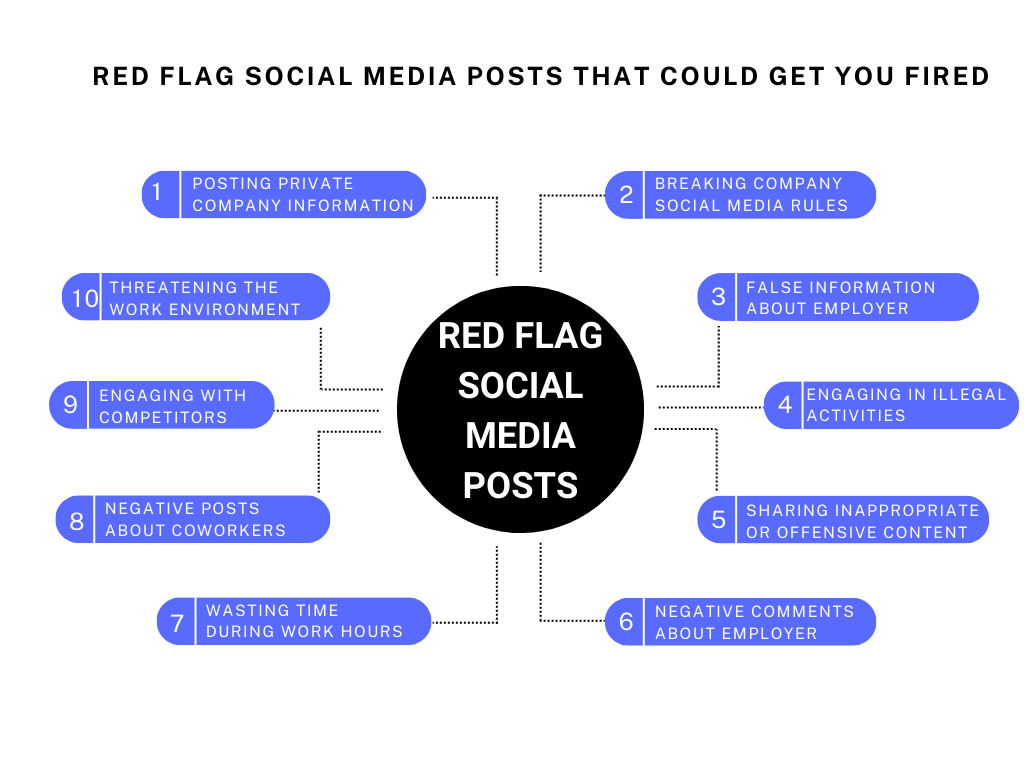Can Employees Be Fired for Social Media Posts By Employers?

Social media platforms have become an important part of modern communication, but they have also introduced new concerns for both employers and employees. One common question is whether an employee can be fired for their social media activity.
Social media can positively influence a career by helping employees build their professional networks, but inappropriate posts can damage reputations and even lead to job loss. While some posts may warrant a warning or removal, more severe cases—such as illegal or offensive content—can result in termination. Employees should be aware that their online presence reflects their professionalism, and careless behavior online can have long-term consequences.
Many employees have been disciplined or fired for sharing content about workplace safety or their views on social movements like Black Lives Matter. While employers generally have the right to fire employees for any lawful reason, employees may be protected by laws that prevent discrimination, retaliation, or wrongful termination, including protections for whistleblowers and those reporting workplace issues.
Social media background checks help employers assess candidates' professionalism and cultural fit, offering benefits like better hiring decisions and spotting red flags
This article explores the legal aspects of social media and employment, outlines red flags that may lead to dismissal, and offers best practices for both employers and employees to navigate this challenging issue.
Can Employers Legally Fire Employees for Social Media Posts?

As social media becomes a platform for employees to express opinions on controversial issues, employers have significant legal discretion to safeguard their interests. However, employment law experts debate how far an employer should go when disciplining employees over such posts. While employers have the right to limit social media use, they must consider factors such as discrimination laws, protected activities, and state laws before taking action.
Employers can legally fire employees for their social media posts, but several factors influence whether such a termination is lawful. Under at-will employment, common in regions like the U.S., employers may terminate employees for any reason, including social media posts, as long as it doesn’t violate specific legal protections.
At-will employment refers to an employment agreement where the relationship between employer and employee can be terminated by either party at any time, for any reason, without prior notice, unless otherwise specified in the employment contract. This type of employment is typically outlined in the relevant contract, and its terms may explicitly state that the employment is indefinite, with no required reason for termination.
However, there are limitations based on laws related to discrimination, whistleblowing, and union activity. For instance, employees are protected from being fired due to race, religion, gender, and other protected categories, and firing an employee for posts related to whistleblowing could be considered illegal retaliation.
Posts related to union activities are generally protected. It’s also important to note that employment contracts may impose additional rules on termination, meaning employers may need to follow specific guidelines when considering social media-related dismissals. Even though First Amendment rights protect free speech, this doesn’t extend to private employers, so employees may still be fired for posts that violate company policies or disrupt the workplace environment.
Red Flag Social Media Posts That Could Get You Fired

Social media can be a double-edged sword for employees. While it's a platform to share personal thoughts and experiences, certain posts can lead to serious consequences at work. Employers are paying close attention to content that could harm their reputation, create workplace issues, or break company policies. Here are examples of social media activities that might result in termination:
1- Breaking Company Social Media Rules
Most businesses have clear social media guidelines that employees must follow. These rules often prohibit posting confidential information or engaging in unprofessional conduct. For example, an assistant account executive was fired for posting a photo of a new client’s logo before the company had made an official announcement. Violating these guidelines can lead to disciplinary actions or even termination.
2- Posting Private Company Information
Sharing internal company secrets or confidential data—such as new product details or strategic plans—can get you fired. Disclosing sensitive company information online can harm the company’s competitive edge and lead to legal repercussions. Be mindful of what you share, even if it seems harmless.
3- Spreading False Information About Employer
Posting lies or spreading false rumors about employer can damage their reputation and result in termination. For instance, a worker was fired after falsely claiming that their company's ambulances were unsafe. Even if you believe your statements are valid, sharing incorrect or misleading information can harm your career.
4- Sharing Inappropriate or Offensive Content
Posting harmful content, such as bullying, harassment, or discriminatory remarks, creates a toxic work environment and violates company policies. For example, an ESPN commentator was fired after posting a video of exotic dancers, which was considered inappropriate for the brand. Employers take these matters seriously, and such posts can result in dismissal.
5- Engaging in Illegal Activities
Posting about illegal behavior, like drug use or theft, can result in immediate termination. A teacher in Colorado was fired after posting about smoking marijuana in a school parking lot, even though it was legal in the state. Sharing any form of illegal activity on social media can cost you your job, regardless of whether it's legal in your area.
6- Negative Comments About Employer
Criticizing employers or coworkers on social media can undermine trust and morale in the workplace. Posting complaints or negative opinions about your job can hurt relationships with colleagues and managers, making it a red flag for termination.
In some cases, it can even lead to termination, especially if the comments create unnecessary conflict or impact morale. It's always best to address workplace concerns directly with HR or management rather than sharing them online.
7- Wasting Time During Work Hours
If you spend too much time on social media during work hours, you risk falling behind on your job responsibilities. Employers expect employees to be productive, and excessive social media use can be seen as a misuse of work time, leading to potential disciplinary action.
8- Negative Posts About Coworkers
Posting about workplace issues or airing grievances about coworkers can cause discomfort and tension in the workplace. It can lead to conflict and may result in HR involvement or termination if it creates a hostile work environment.
In some cases, it could result in termination if the posts create unnecessary discomfort or conflict among employees. It's essential to maintain professionalism both in person and online, and handle workplace issues privately and appropriately.
9- Engaging with Competitors
Discussing or sharing content related to a competing business can raise concerns about loyalty and confidentiality. If you are involved in activities that could be seen as betraying your employer, such as sharing proprietary information or promoting competitors, it can lead to disciplinary action or job loss.
For example, an employee who posts favorable comments about a competitor on LinkedIn or shares confidential business information can be seen as disloyal, leading to disciplinary actions. Always keep your professional affiliations clear and avoid actions that could be perceived as undermining your current employer.
10- Threatening the Work Environment
Posts that threaten or intimidate others in the workplace—whether directed at coworkers, supervisors, or even customers—are serious offenses. Racist, sexist, or violent comments made online can create a hostile work environment, which is grounds for immediate termination.
Many employers have a zero-tolerance policy when it comes to harassment or threats, whether they occur in the office or online. Be mindful of your tone and language when posting on social media, as inappropriate comments can have severe consequences.
How Employers Identify Employee Social Media Misconduct
Companies establish core values that guide their operations, but sometimes employees violate these principles, both in the workplace and online. To address misconduct effectively, businesses need to define what actions are considered violations clearly.
Misconduct, unfortunately, is an inevitable issue within any organization, but it can be managed effectively with clear policies in place. Employee handbooks should outline specific consequences for violations of company guidelines, including social media misconduct.
Employers use various methods to monitor and detect social media misconduct, including:
- Social Media Monitoring Tools:
Employers use software to monitor public posts and profiles for content that could harm the company’s reputation or violate policies. These tools can analyze text, images, videos, and interactions such as likes, shares, and comments.
They typically flag content that includes hate speech, harassment, illegal activities, excessive profanity, or other forms of inappropriate behavior.
However, while these tools are effective, employers must balance monitoring efforts with employee privacy rights. It is crucial to ensure that monitoring focuses solely on publicly available information to avoid any overreach into private accounts.
- Company Social Media Policies:
Clear and comprehensive social media policies help set guidelines for acceptable online behavior and outline specific types of violations.
Examples of prohibited behavior may include promoting violence or making threats, sharing sexually explicit content, engaging in cyberbullying, leaking confidential company information, or making discriminatory remarks.
These policies should also specify consequences for each type of violation and provide real-life examples to eliminate ambiguity. Regular training sessions and policy updates can reinforce these guidelines, ensuring employees understand what is considered acceptable and unacceptable behavior online.
- Legal Investigations:
Misconduct such as harassment, fraud, or discrimination may sometimes lead to formal investigations. These investigations often involve gathering evidence from social media posts, direct messages, and interactions.
Employers must ensure that their investigative processes comply with privacy laws and respect employee rights. To maintain fairness and transparency, it is advisable to involve HR professionals or legal teams when conducting these investigations.
A well-documented process helps protect both the employee and the company from potential legal challenges.
- Reports from External Sources:
Sometimes, misconduct is brought to light through complaints or alerts from external sources such as customers, clients, or the general public. For instance, a customer might report an employee’s offensive or unprofessional behavior on social media, or a viral post may highlight inappropriate conduct. To manage such situations, employers should establish clear processes for receiving and addressing complaints, such as dedicated hotlines, emails, or anonymous reporting portals. All complaints should be investigated thoroughly and impartially to ensure a fair outcome for everyone involved.
- Employee-Flagged Misconduct:
Inappropriate social media behavior may also be reported by an employee’s colleagues. To facilitate this, companies can implement whistleblower policies that protect employees from retaliation when they report misconduct.
Clear reporting channels, such as online forms or direct contact with HR, help employees submit their concerns easily. Regular training on identifying and reporting violations can ensure employees are aware of what constitutes inappropriate behavior.
Investigations should be prompt, and fair, maintaining confidentiality and transparency the process.
- Background Check Services:
Employers may include social media screening as part of pre-employment background checks or ongoing employee evaluations. These services are designed to identify potential red flags, such as posts related to harassment, threats, illegal activities, or negative attitudes toward previous employers.
When using background check services, it is crucial to comply with applicable laws like the Fair Credit Reporting Act (FCRA), which requires transparency and candidate consent. Employers should also ensure that their screening criteria are consistent and non-discriminatory to avoid legal risks and promote fairness in the hiring process.
Employers can regulate social media use, especially during work hours, but they cannot discipline employees for discussing workplace conditions, pay, or illegal activities. It’s important for employees to review company handbooks for social media policies, which may include anti-retaliation provisions to protect employees who speak out about harassment or illegal actions.
To ensure consistency, fairness, and ethical standards, organizations should treat all employees equally within the established guidelines. Candidate screening technologies can help detect potential risks before hiring and analyze social media content to avoid hiring individuals whose online conduct could create a toxic work environment.
By setting clear expectations and enforcing them consistently, businesses can promote a culture of accountability and maintain a positive, professional atmosphere.
Ferretly’s social media background checks services help employers improve workplace culture, reduce turnover, creates a safer environment, and mitigate risk to your brand.
How Employers Avoid Social Media Misconduct with Social Media Screening
Employers can take several proactive steps to minimize the risks associated with social media posts:
- Pre-Employment Screening: Using social media screening as part of the hiring process can help employers identify potential red flags.
- Clear Social Media Policies: Establishing well-defined policies regarding social media use and posting helps employees understand what is acceptable.
- Regular Training: Offering training on appropriate social media conduct ensures employees are aware of the company’s expectations.
- Ongoing Monitoring: Regularly checking employees’ social media activity helps detect misconduct early.
- Self-Reporting: Encouraging employees to report their own social media violations can foster a culture of accountability.
- Legal Compliance: Ensuring that the company complies with legal protections while screening and monitoring social media.
How Employees Avoid Being Fired for Social Media Posts
Employees can take several steps to avoid termination due to social media posts:
- Understand Company Policies: Familiarize yourself with your company’s social media guidelines.
- Maintain Privacy Settings: Set your social media accounts to private, so that personal posts are less likely to be seen by employers.
- Think Before You Post: Consider the potential impact of your posts on your professional reputation and the company.
- Separate Personal and Professional Accounts: Keep work-related content separate from personal life by creating different social media accounts for each.
- Avoid Posting During Work Hours: Focus on your job during work hours to prevent wasting time on social media.
- Be Professional: Always maintain a professional tone when posting, even when discussing personal matters.
- Don’t Share Confidential Information: Never post anything that could jeopardize the company’s reputation or violate confidentiality agreements.
- Consider the Consequences: Always think about how your posts could affect your job or your employer before sharing them online.
Examples of Employees Getting Fired for Social Media Posts
Social media posts can have serious consequences for employees, especially when they involve illegal activities, violence, or hate speech.
Real-life cases demonstrate the serious consequences of social media misconduct. For example:
- Ally:
An employee named Ally lost her job after posting a photo that violated her company’s social media conduct policy. This underscores the importance of understanding and following company guidelines on appropriate online behavior. - School Teacher:
A high school teacher was dismissed for tweeting about her partying lifestyle. This case, often cited in discussions of women fired for social media posts, highlights how even personal content can be seen as reflecting poorly on professional roles. The school decided that her posts undermined her responsibilities as an educator, demonstrating the risks of sharing certain aspects of private life online. - Justine Sacco:
A public relations executive was terminated after posting a racist tweet before boarding a flight. Her post quickly went viral, damaging both her personal reputation and that of her company, illustrating how swiftly social media can impact employment. - Citigroup fired employees:
Citigroup and the Illinois State Comptroller's Office fired employees for making antisemitic comments on social media. These terminations highlight a zero-tolerance stance toward hate speech and the expectation for employees to uphold company values online. - Virginia sheriff’s deputy:
A deputy in Virginia was fired after violent comments appeared on his Parler account. Although he claimed his account was hacked, the severity of the posts led to his immediate dismissal, showing how seriously organizations take threats of violence.
These incidents show how inappropriate social media activity can lead to job termination, emphasizing the importance of clear workplace social media policies.
The Role of Ferretly AI Screening Services in Social Media Screening
Ferretly offers AI-powered screening services that help employers identify potential risks in employees’ social media activity. By screening social media content during the hiring process or monitoring current employees, Ferretly helps employers avoid costly mistakes and maintain a safe work environment.
Ferretly's AI tools offer:
- Automated Screening: Identify inappropriate content quickly and efficiently.
- Legal Compliance: Ensure your social media screening adheres to relevant laws and regulations.
- Risk Mitigation: Prevent hiring employees who may pose a risk due to their online behavior.
At Ferretly, we’ve built a team of innovators focused on one goal: helping businesses succeed in the digital world. We’re not here to control or censor — we’re here to guide and support. Our technology is your partner, giving you the tools to understand and navigate the digital landscape where knowledge is key.
Frequently Asked Questions
1- Can Employees Get Fired for Posting During Working Hours?
Yes, employees can be fired for posting on social media during work hours, especially if it interferes with their job duties or violates company policy.
The timing of a social media post is important when determining potential disciplinary action. Employees generally have more freedom to post outside of work, but during work hours, employers can regulate social media use.
Even outside of work, inappropriate posts, like the infamous case of a PR executive's offensive tweet, can lead to termination. Setting a profile to private does not guarantee protection, as public posts can still be shared, and courts often rule that there is no expectation of privacy on platforms like Facebook or Twitter.
2- What Can Employees Do if They’ve Been Unfairly Fired for Social Media Posts?
Employees should seek legal counsel if they believe their termination was unjust or based on unlawful grounds, such as discrimination or retaliation.
Many employers have the right to discipline employees for their online activity, employees also have certain legal protections. If a client comes to us after facing consequences for their social media use, we help them navigate the legal landscape by reviewing their posts, the company’s policies, potential unjust reasons for the discipline, and how other employees have been treated in similar situations. This comprehensive approach ensures that employees understand their rights and options.
3- Can Employees Get Fired for Posting a TikTok Video at Work?
If the video violates company policy or portrays the company in a negative light, yes, employees could face termination.
4- Can an Employee Get Fired for a Facebook Post?
Yes, if the post violates company policy, threatens the company’s reputation, or creates a hostile work environment, the employee may be fired.
5- How Can Employees Find Out Why They Were Fired?
Employees can request an explanation from their employer or file a claim with the appropriate labor board if they believe they were terminated unfairly.
Conclusion
In conclusion, while social media offers employees a platform for self-expression, it also carries significant risks. By understanding company policies, using privacy settings, and practicing caution, employees can minimize the chances of losing their jobs due to their online behavior. Employers, on the other hand, can use tools like Ferretly’s AI screening services to screen candidates and monitor employees effectively, ensuring compliance and reducing the risks of social media-related misconduct.






